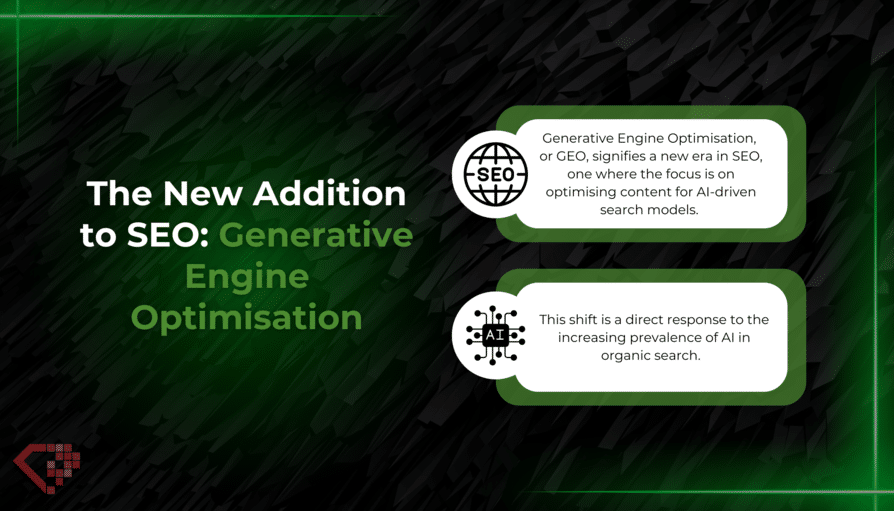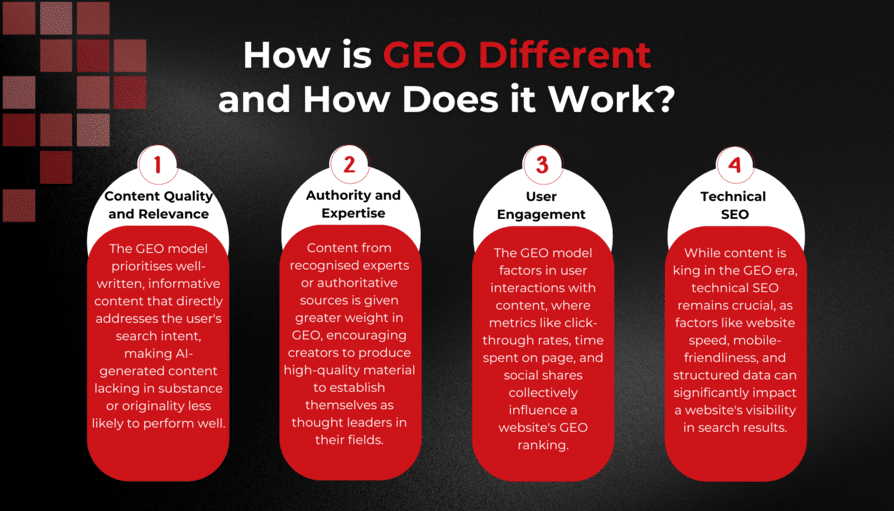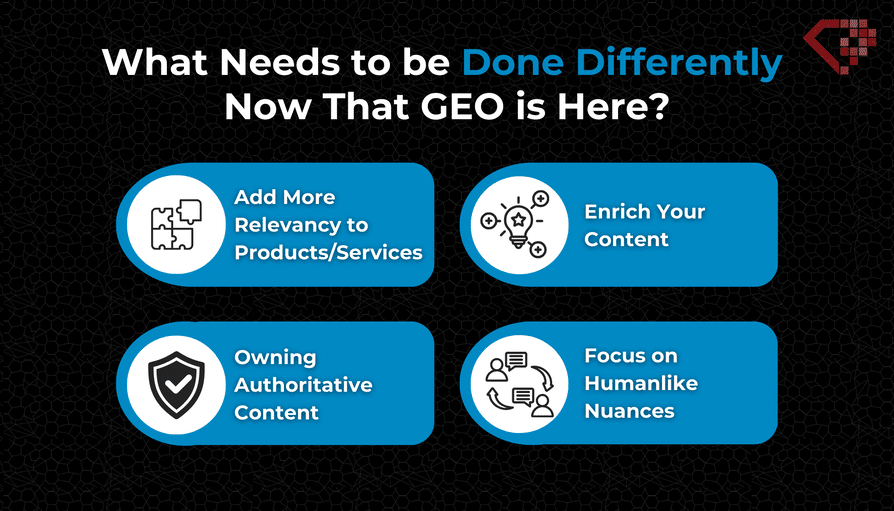At Ruby Digital, we know the digital landscape is constantly evolving, and Search Engine Optimisation (SEO) is no exception. As AI (artificial intelligence) continues its meteoric rise, its impact on how everybody searches for and consumes information online is undeniable. The industry has already witnessed the transition from traditional SEO to Search Generative Experience (SGE).
And now, we stand on the cusp of yet another paradigm shift: Generative Engine Optimisation (GEO). In this blog post, we will analyse and unpack the intricacies of AI SEO and GEO. We will look at its implications for SEO companies and clients and show you how Ruby Digital is staying ahead of the curve in the dynamic digital landscape of AI SEO optimisation.
What Is GEO?
Generative Engine Optimisation, or GEO, signifies a new era in SEO, one where the focus is on optimising content for AI-driven search models. This shift is a direct response to the increasing prevalence of AI in organic search.
AI models like ChatGPT, Gemini, Microsoft Bing, and Google AI are all playing increasingly pivotal roles. GEO’s primary goal is to align your content with these AI models to ensure that your website ranks high in search results and delivers the most usable and valuable information to users.

AI and SEO:
For SEO professionals, this means adapting their strategies to cater to these AI-powered search engines. The days of keyword stuffing and other outdated tactics are gone! GEO and SEO demand a close focus on high-quality, human-centric content that provides genuine value to users. It is about clearly understanding the nuances of AI search models and closely tailoring your GEO SEO content to meet their specific requirements.
While GEO shares some similarities with traditional SEO and SGE, it also represents a significant departure. Traditional SEO primarily focused on optimising for specific keywords and phrases, while SGE aimed to provide users with a more comprehensive and informative search experience.
GEO takes this process a step further. It prioritises content that is not only relevant and informative, but also engaging, authoritative, and tailored to the specific needs of AI search models.
How Is GEO Different, and How Does It Work?
The GEO model functions by analysing a vast array of data points to determine the most relevant and valuable content for a given search query. Unlike traditional SEO and SGE, which relied heavily on keywords and backlinks, GEO considers a much broader range of factors, including:
- Content Quality and Relevance: The GEO model places a premium on content that is well-written, informative, and directly addresses the purpose of the user’s search. AI-generated content that lacks substance or originality is unlikely to fare well under this model.
- Authority and Expertise: Content created by recognised experts or authoritative sources is given greater weight in GEO. This encourages quality as content creators aim to establish themselves as thought leaders in their respective fields.
- User Engagement: The GEO model also considers how users interact with content. Metrics such as click-through rates, time spent on page, and social shares will all influence a website’s GEO ranking.
- Technical SEO: However, while content is king in the GEO era, technical SEO remains crucial. Factors such as website speed, mobile-friendliness, and structured data can all impact a website’s visibility in search results.
To sum up, the goal of the GEO model is to provide users with the best possible content in the face of a growing sea of AI-generated content. By considering a wider range of factors, GEO aims to prevent low-quality AI-generated content from dominating search results. It aims to ensure that users are presented with the most relevant and valuable information on their Search Engine Results Page (SERP).
One of the key distinctions of GEO is its emphasis on creating a more conversational search experience. As AI search models become more sophisticated, they can understand the nuances of human language and intent better. This allows users to interact with search engines in a more natural and intuitive way, by asking questions and receiving answers that are tailored to their specific needs.

How SEO Has Evolved and Where We Are Now
The journey from traditional SEO to GEO has been a remarkable one, and it reflects the volatile and dynamic nature of today’s digital landscape. In the ‘early days’ of SEO, the focus was primarily on optimising for specific keywords and phrases.
This often led to content that was keyword-stuffed, was low on quality and which lacked genuine value for users. As search engines became more sophisticated, however, they began to prioritise content that was not only relevant, but also informative and engaging. This marked the notable transition to SGE (Search Generative Experience). In SGE the emphasis was on providing users with a more comprehensive, relevant, and informative search experience.
SGE introduced features like featured snippets and knowledge panels. These aimed to provide users with direct answers to their queries without requiring them to click through to a website. It also placed a greater emphasis on creating content that was not only informative, but also well-structured and easy for search engines to understand.
The emergence of Generative Engine Optimisation (GEO) presents the next important stage in this digital evolution. With the rise of AI-generated content, search engines are faced with an ongoing challenge of distinguishing between high-quality, human-created content, and low-quality, AI-generated content.
GEO addresses this challenge by prioritising content that demonstrates authority, expertise, and user engagement. Generative engine optimisation ensures that users are presented with the most relevant and valuable information, even in the face of a tsunami of indifferent AI-generated content.
What Needs to be Done Differently Now that GEO Is Here?
With the arrival of GEO, SEO strategies need to evolve to keep pace with the changing digital landscape. The focus is now on creating content that is not only optimised for AI search models, but also provides genuine relevant value to users.
These are key requirements to consider when developing a GEO-focused strategy:
- Adding More Relevancy to Products/Services: Provide detailed product specifications, brand information, and other relevant details to help AI search models understand the context of your content.
- Owning Authoritative Content: Create content that is well-researched, informative, and demonstrates your expertise in your field. This will help establish your website as a trusted source of information.
- Enriching Your Content: Use punchy, unique, and technically relevant wording to make your content stand out. Avoid generic language, clichés, and focus on providing fresh perspectives and insights.
- Focusing on Humanlike Nuances: Ensure that your content is written in a natural, conversational style that is easy for users to understand and engage with. Avoid overly technical jargon or robotic language.
By incorporating these elements into your SEO strategy, you will ensure that your content is optimised for both AI search models and human users. This will help you achieve higher rankings in search results, attract more qualified traffic to your website, and drive more conversions.

Ruby Digital – Always at the Forefront!
Ruby Digital has already embraced the principles of GEO and are incorporating them into our current strategies. Our focus has always been on creating high-quality, focused, and relevant content that provides genuine value to users.
We work closely with our clients to ensure that their websites contain all the necessary information about their products and services, providing transparency, engaging with, and building trust with their audience.
We have also always prioritised a user-first approach to content creation. We understand that the goal of GEO and SEO strategies is to connect users with the information they want, and that our clients wish to give to them. Therefore, we ensure that our clients’ websites are well-positioned for success in the GEO era by creating content that is informative, engaging and tailored to the needs of human users.
Generative Engine Optimisation represents a significant shift in the SEO landscape that no digital marketer can afford to ignore. As AI continues to play an ever more prominent role in search, it is mandatory for businesses to adapt their strategies to meet the demands of these new search models.
By focusing on high-quality, human-centric content that provides genuine value to users, businesses can ensure that their websites are and remain visible and relevant in the ever-evolving world of search.
At Ruby Digital, we are committed to helping our clients navigate this changing landscape and achieve their online marketing goals. We understand the intricacies of GEO and are already implementing best practices to ensure that our clients’ websites are optimised for success. We will take you that vital step closer to speaking to Google like you are talking to another human!
If you are looking for an experienced and highly rated content marketing agency or SEO company that can help you stay ahead of the curve, Ruby Digital is here for you! We have the expertise and experience to help you prosper in the age of GEO.



